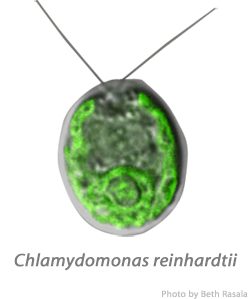About
- Why Algae?
- Educational Resources
- People
- Photos and Vidoes
- Contact Us

Algae are fast growing organisms that turn sunlight into chemical energy. Microalgae, including single-celled algae and cyanobacteria, grow in water and produce proteins and lipids that can be used to for bio products and biofuels.
Algae grow quickly, need relatively low-nutrient inputs, and get their energy from sunlight. Algae can thrive in saltwater and even wastewater, so large-scale algae production need not further tax our already over-subscribed fresh water resources.
Algae farms can use land that’s otherwise unsuitable for conventional agriculture. This means algae growth won’t compete with food production, unlike traditional biofuel row crops, such as corn or soybeans. Compared to crops used to produce vegetable oil, algae can generate up to 50 times the amount of oil per acre.
Algae take carbon dioxide (CO2) from the air while growing, making carbon sequestration a beneficial by-product of large-scale algae production. Algae farms could be located near industrial pollution sources, such as carbon-producing refineries or power plants, and help clean the air by consuming CO2 as they grow. Algae production creates green-collar jobs in struggling areas, like California’s Imperial Valley, which has an unemployment rate of more than 20%.